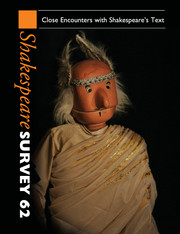Book contents
- Frontmatter
- Shakespeare, text and paratext
- The popularity of Shakespeare in print
- The continuing importance of new Bibliographical method
- ‘Honour the real thing’: Shakespeare, Trauma and Titus Andronicus in South Africa
- ‘O, these encounterers’: on Shakespeare’s meetings and partings
- A play of modals: Grammar and potential action in early Shakespeare
- Merry, marry, Mary: Shakespearian wordplay and Twelfth Night
- A subtle point: Sleeves, tents and ‘Ariachne’s broken woof’ (again)
- The look of Othello
- Red button Shakespeare
- ‘Mark you / his absolute shall?’: Multitudinous tongues and contested words in Coriolanus
- Chagall’s Tempest: An autobiographical reading
- Reading illustrated editions: Methodology and the limits of interpretation
- Close encounters with Anne Brontë's Shakespeare
- Shakespeare and the magic lantern
- Shakespeare and the coconuts: close encounters in post-apartheid South Africa
- The Schrödinger effect: Reading and misreading performance
- Behind the scenes
- Inner monologues: Realist acting and/as Shakespearian performance text
- More japanized, casual and transgender shakespeares
- Translation futures: Shakespearians and the foreign text
- After translation
- ‘The single and peculiar life’: Hamlet’s heart and the early modern subject
- Mapping King Lear
- ‘Last on the stage’: The place of Shakespeare in Charles Darwin’s ethology
- Sense/memory/sense-memory: Reading narratives of Shakespearian rehearsals
- Shakespeare performances in England (and Wales), 2008
- Professional Shakespeare productions in the British Isles, January–December 2007
- The Year's Contributions to Shakespearian Study 1 Critical Studies
- 2 Shakespeare in performance
- 3a Editions and textual studies
- 3b Editions and textual studies
- Index to Volume 62
‘Last on the stage’: The place of Shakespeare in Charles Darwin’s ethology
Published online by Cambridge University Press: 28 November 2009
- Frontmatter
- Shakespeare, text and paratext
- The popularity of Shakespeare in print
- The continuing importance of new Bibliographical method
- ‘Honour the real thing’: Shakespeare, Trauma and Titus Andronicus in South Africa
- ‘O, these encounterers’: on Shakespeare’s meetings and partings
- A play of modals: Grammar and potential action in early Shakespeare
- Merry, marry, Mary: Shakespearian wordplay and Twelfth Night
- A subtle point: Sleeves, tents and ‘Ariachne’s broken woof’ (again)
- The look of Othello
- Red button Shakespeare
- ‘Mark you / his absolute shall?’: Multitudinous tongues and contested words in Coriolanus
- Chagall’s Tempest: An autobiographical reading
- Reading illustrated editions: Methodology and the limits of interpretation
- Close encounters with Anne Brontë's Shakespeare
- Shakespeare and the magic lantern
- Shakespeare and the coconuts: close encounters in post-apartheid South Africa
- The Schrödinger effect: Reading and misreading performance
- Behind the scenes
- Inner monologues: Realist acting and/as Shakespearian performance text
- More japanized, casual and transgender shakespeares
- Translation futures: Shakespearians and the foreign text
- After translation
- ‘The single and peculiar life’: Hamlet’s heart and the early modern subject
- Mapping King Lear
- ‘Last on the stage’: The place of Shakespeare in Charles Darwin’s ethology
- Sense/memory/sense-memory: Reading narratives of Shakespearian rehearsals
- Shakespeare performances in England (and Wales), 2008
- Professional Shakespeare productions in the British Isles, January–December 2007
- The Year's Contributions to Shakespearian Study 1 Critical Studies
- 2 Shakespeare in performance
- 3a Editions and textual studies
- 3b Editions and textual studies
- Index to Volume 62
Summary
I do not think any spectacle can be more interesting, than the first sight of Man in his primitive wildness.
(Darwin to J. S. Henslow, 11 April 1833)THE BEAST AND THE SWAN
Along with 'the exquisite glorious delight' of tropical scenery, the encounter with the 'bona fide savages' of Tierra del Fuego marked the highlight of Charles Darwin's Beagle voyage (1831-6). Darwin was fascinated and repulsed in equal measure by 'the most curious and interesting spectacle' of Fuegians, whose attitudes and countenance were not only 'abject' but 'distrustful, surprised, and startled'. The tribes inhabiting Wollaston Island were in particular 'the most abject and miserable creatures' Darwin ever saw: 'These poor wretches were stunted in their growth, their hideous faces bedaubed with white paint, their skins filthy and greasy, their hair entangled, their voices discordant, their gestures violent and without dignity.' Darwin could hardly believe them to be 'fellow-creatures, and inhabitants of the same world'. The difference between a primitive and civilized man seemed 'greater than between a wild and domesticated animal, in as much as in man there is a greater power of improvement', and, to Darwin, 'the cr[ie]s of domestic animals are far more intelligible' than the 'tones' and 'gesticulations' of Fuegians.
- Type
- Chapter
- Information
- Shakespeare Survey , pp. 317 - 327Publisher: Cambridge University PressPrint publication year: 2009



